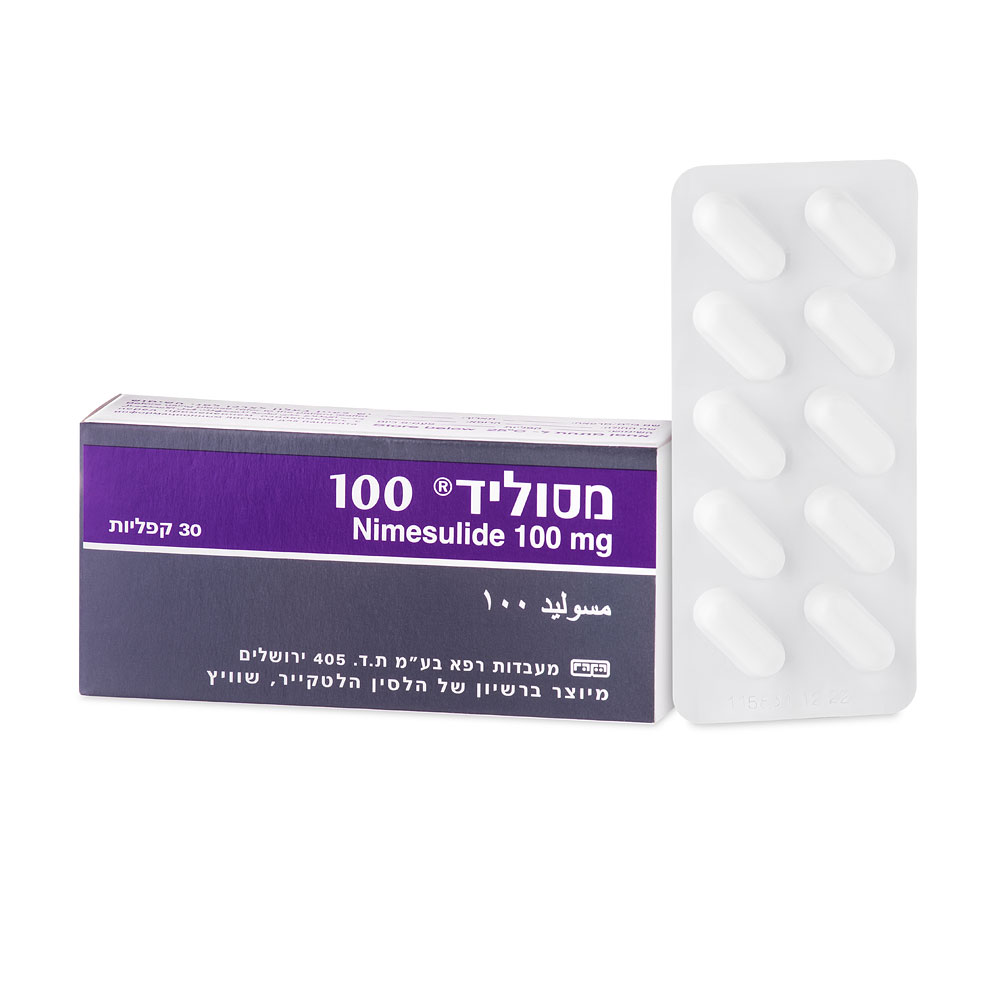Quest for the right Drug

מסוליד 100 MESULID 100 (NIMESULIDE)
תרופה במרשם
תרופה בסל
נרקוטיקה
ציטוטוקסיקה
צורת מתן:
פומי : PER OS
צורת מינון:
קפליות : CAPLETS
עלון לרופא
מינוניםPosology התוויות
Indications תופעות לוואי
Adverse reactions התוויות נגד
Contraindications אינטראקציות
Interactions מינון יתר
Overdose הריון/הנקה
Pregnancy & Lactation אוכלוסיות מיוחדות
Special populations תכונות פרמקולוגיות
Pharmacological properties מידע רוקחי
Pharmaceutical particulars אזהרת שימוש
Special Warning עלון לרופא
Physicians Leaflet
Interactions : אינטראקציות
4.5 Interaction with other medicinal products and other forms of interaction Pharmacodynamic interactions: Other non-steroidal anti-inflammatory drugs (NSAIDs): The combined use of Mesulid (see section 4.4) with other non-steroidal anti-inflammatory drugs, including acetylsalicylic acid given at anti-inflammatory doses (≥ 1g as single intake or ≥ 3g as total daily amount) is not recommended. Corticosteroids Increased risk of gastrointestinal ulceration or bleeding (see section 4.4). Anti-coagulants: NSAIDs may enhance the effects of anti-coagulants, such as warfarin (see section 4.4). Patients receiving warfarin or similar anticoagulant agents have an increased risk of bleeding complications, when treated with Mesulid. Therefore this combination is not recommended (see also section 4.4) and is contraindicated in patients with severe coagulation disorders (see also section 4.3). If the combination cannot be avoided, anticoagulant activity should be monitored closely. Anti-platelet agents and selective serotonin reuptake inhibitors (SSRIs): increased risk of gastrointestinal bleeding (see section 4.4). Diuretics, Angiotensin Conversion Enzyme Inhibitors (ACE inhibitors) and Angiotensin II Antagonists (AIIA): NSAIDs may reduce the efficacy of diuretics and that of other antihypertensive drugs. In some patients with reduced renal function (e.g. dehydrated patients or elderly subjects with impairment of renal function), Page 3 of 8 concomitant administration of an ACE inhibitor and cyclo-oxygenase inhibitors may result in progression of the deterioration of renal function, including the possibility of acute renal insufficiency, which is normally reversible. The occurrence of these interactions should be taken into consideration in patients who have to take Mesulid in association with ACE inhibitors or AIIA. Consequently, this drug association should be administered with precaution, especially in elderly patients. Patients should be properly hydrated, and the need for monitoring of renal function after starting the concomitant treatment and periodically after that should be analysed. Pharmacokinetic interactions: effect of nimesulide on the pharmacokinetics of other drugs. Furosemide: In healthy subjects, nimesulide transiently decreases the effect of furosemide on sodium excretion and, to a lesser extent, on potassium excretion and reduces the diuretic response. Co-administration of nimesulide and furosemide results in a decrease (of about 20%) of the AUC and cumulative excretion of furosemide, without affecting its renal clearance. The concomitant use of furosemide and Mesulid requires caution in susceptible renal or cardiac patients, as described under section 4.4. Lithium: Non-steroidal anti-inflammatory drugs have been reported to reduce the clearance of lithium, resulting in elevated plasma levels and lithium toxicity. If Mesulid is prescribed for a patient receiving lithium therapy, lithium levels should be monitored closely. Potential pharmacokinetic interactions with glibenclamide, theophylline, warfarin, digoxin, cimetidine and an antacid preparation (i.e. a combination of aluminium and magnesium hydroxide) were also studied in vivo. No clinically significant interactions were observed. Nimesulide inhibits CYP2C9. The plasma concentrations of drugs that are substrates of this enzyme may be increased when Mesulid is used concomitantly. Caution is required if nimesulide is used less than 24 hours before or after treatment with methotrexate because the serum level of methotrexate might increase and therefore, the toxicity of this drug might increase. Due to their effect on renal prostaglandins, prostaglandin synthetase inhibitors like nimesulide may increase the nephrotoxicity of cyclosporins. Pharmacokinetic Interactions: Effects of other drugs on the pharmacokinetics of nimesulide: In vitro studies have shown displacement of nimesulide from binding sites by tolbutamide, salicylic acid and valproic acid. However, despite a possible effect on plasma levels, these interactions have not demonstrated clinical significance.

שימוש לפי פנקס קופ''ח כללית 1994
לא צוין
תאריך הכללה מקורי בסל
לא צוין
הגבלות
לא צוין
מידע נוסף
עלון מידע לצרכן
09.01.22 - עלון לצרכן אנגלית 15.08.22 - עלון לצרכן עברית 09.01.22 - עלון לצרכן ערבית 05.12.22 - עלון לצרכן אנגלית 05.12.22 - עלון לצרכן עברית 05.12.22 - עלון לצרכן ערבית 01.03.23 - עלון לצרכן 11.05.23 - עלון לצרכן ערבית 26.02.12 - החמרה לעלון 24.01.21 - החמרה לעלון 05.07.21 - החמרה לעלון 15.08.22 - החמרה לעלון 01.03.23 - החמרה לעלוןלתרופה במאגר משרד הבריאות
מסוליד 100